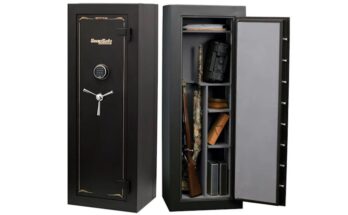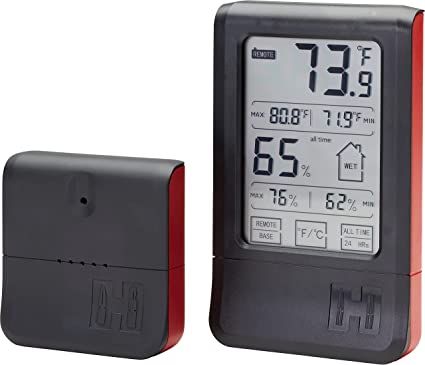When it comes to the home defense, the first thing you probably think of is picking up a gun. Whether a long rifle or a handgun, a suitable location is the next crucial thing to look for. So, where can you keep a firearm for home defense?
It is recommended to keep your weapons in different locations of the house to ensure better protection. Decentralization becomes the best way to ensure home security. The downsides to decentralization are that you have to spend a lot of money on a gun safe and guns. So, you can opt for guns and safes to cut the cost.
Where To Keep Gun For Home Defense?
Master bedroom
A master bedroom is a suitable place to keep gun for home defense. At first, it is likely to attract burglary or theft. Alternatively, you spend much of your time here. So, it would be an excellent decision to keep a gun on your side. But the best thing is to keep the gun in the box next to the master bedroom, which you can quickly access in just two seconds in an emergency.
Also, you can keep your gun in the safe under the bed. If you have many weapons that need to be stored, you can choose a sizeable biometric safe in the right location in the master bedroom. Wherever you place your safe, you must ensure that it is easily accessible.
A closet near the exit door
The closet is a decent place to keep a gun, as thieves often ignore it. They usually have a plan and look for expensive, readily available items. They do not want to waste time looking around. Even though they are not likely to look in the closet, don’t leave a gun inside. You can build a hidden box in a closet to keep the weapon or use a safe.
Always avoid confrontation because the thieves may be armed with multiple weapons. The first thing to do if you notice intruders in your home is to get out immediately. When you are sure you are in a safe place, call 911.
Kitchen pantry
A kitchen pantry can be a great place to keep a gun for home defense. Here, thieves cannot think of it. If you are in a kitchen during an attack on your home, you will immediately get access to a gun. However, keep in mind that the weapon is protected from fire. It is best to have a small fire-resistant gun safe in the pantry.
Guest bedroom
The guest bedroom becomes the best place to keep a gun for home defense. However, don’t completely rule out the possibility of thieves looking there. The additional rooms generally contain few valuables and other items, so you have plenty of room to store your weapon and don’t have to worry very much.
However, keep in mind that the safe may seem obvious, as there is usually nothing in the rooms. To build a hidden box or find another innovative way to make a gun less visible. Also, don’t forget to move it to another place, which is safe if you have guests. You don’t want to scare them with a gun in the room.
The holster attached to a bed or sofa
Purchasing a gun holster is an excellent investment in keeping your gun for home defense. You can buy a holster, which you can attach to the sofa or the bed. You can adjust the weapon so that it grips quickly in dangerous situations.
Many holsters cover a trigger and provide additional protection. Remember to consider the shape and size of your weapon before purchasing it. Smaller weapons can easily be attached to sofas and beds, but larger ones can be a little difficult to store. Also, regularly dry and clean the holster to prevent moisture from getting it.
Concealment furniture
It’s no wonder that concealment furniture like the cabinet is growing in popularity as it’s a great choice to keep a gun for home defense. The ordinary concealment furniture appears like normal headboards, coffee tables, and bookcases. Manufacturers come up with more practical and creative ideas to keep a gun and other weapons. Many concealment furniture does their job so well that others don’t even know there’s a gun in it.
Hiding a gun in different places in the house
If you hide the gun in different places around the house, you can quickly access it in case of an emergency. There are several ways to keep it, such as hiding under a bench, tea table, inside a book, wall clock, ceiling, mirror dressing table and the roof. That said, there are other methods to keep a gun for home defense.
Places To Be Avoided When Keeping A Gun For Home Defense
A gun case, which absorbs moisture
Do not keep a gun in a case, which can absorb moisture. Exposing a firearm to the element can cause rust, and corrosion becomes the last thing a gun owner wants to see. Typical culprits are leather cases, cardboard boxes, plastic boxes, and fabrics. All of these materials are susceptible to moisture build-up with time. If you plan to keep your gun in a leather holster, dry and clean it frequently to prevent corrosion.
Hard-to-reach areas (for adults)
Avoid keeping your gun in hard-to-reach areas. You don’t have much time to grab a gun and get out of a house in an emergency. For example, a garage and basement are not ideal for storing weapons. So keep your home defense weapon in places, which are easily accessible, but always out of sight.
Nightstands
Nightstands are readily available in case of an emergency. Nevertheless, these are not the best places to store weapons when children are around. Also, place it on a premise, not on top. It can be dangerous if you accidentally use a gun instead of an alarm clock.
How To Keep Guns For Home Defense
Keeping guns for home defense is a serious responsibility, and it’s important to prioritize safety and legality. Here are some steps to consider if you’re planning to keep guns for home defense:
- Understand Your Local Laws: First and foremost, familiarize yourself with the laws and regulations regarding firearm ownership and use in your jurisdiction. Laws can vary significantly from one place to another, so make sure you are in compliance with all local, state, and federal laws.
- Get Proper Training: Before obtaining a firearm, it’s essential to receive proper training in firearm safety and use. Many organizations and shooting ranges offer courses on firearm safety, handling, and marksmanship. Training will help you become a responsible and safe gun owner.
- Choose the Right Firearm: Select a firearm that suits your needs and comfort level. For home defense, a shotgun, handgun, or semi-automatic rifle are common choices. Choose a firearm that you can handle comfortably and accurately.
- Secure Storage: Always store your firearms in a secure manner when they are not in use. This is especially important if you have children or unauthorized individuals in your home. Consider investing in a gun safe or lockbox to prevent unauthorized access. Keep ammunition separate from firearms.
- Practice Regularly: Owning a firearm is not enough; you need to practice regularly to maintain proficiency. This includes both target practice and familiarizing yourself with the operation of your firearm. Regular practice will help you use your firearm effectively in a high-stress situation.
- Plan for Home Defense: Develop a home defense plan that includes the use of firearms, if necessary. Discuss this plan with your family members, so everyone knows what to do in case of an intruder or emergency.
- Use Lethal Force as a Last Resort: Firearms should only be used as a last resort to protect yourself and your loved ones from imminent threats to life. Be aware of the legal and moral implications of using lethal force, and make sure you can articulate the threat when explaining your actions to authorities.
- Consider Less-Lethal Options: In some situations, non-lethal options like pepper spray, a Taser, or a baton may be more appropriate for home defense. These options can incapacitate an intruder without causing permanent harm.
- Maintain Situational Awareness: Being aware of your surroundings and having a plan in place can often prevent the need to use a firearm for self-defense. Secure your home with good locks, an alarm system, and proper lighting to deter potential threats.
- Regularly Inspect and Maintain Firearms: Firearms require regular maintenance to ensure they function properly. Clean and inspect your firearms according to the manufacturer’s recommendations.
- Seek Legal Advice: Consult with an attorney who specializes in firearms and self-defense laws in your jurisdiction. They can provide guidance on your rights and responsibilities as a gun owner and help you understand when the use of force is legally justified.
Remember that owning a firearm for home defense is a significant responsibility, and it comes with legal, ethical, and safety considerations. Seek education, training, and legal advice to make informed decisions about firearm ownership and use.
Conclusion
One of the most crucial parts of home defense is the keeping of the gun. For that, it is always recommended for the decentralization of weapons. Therefore, in case of invasion at home, you need the option to defend yourself from intruders. And with the above ways, your gun will be secure for home defense.
Related Post:
How To Secure A Gun Safe In An Apartment?
How to Install Gun Safe in a Closet?



